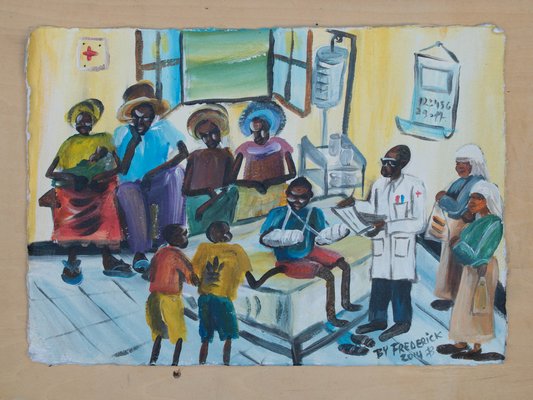
One day in 1998, three words sealed Frederick Ndabaramiye’s fate: “Kill me first.”
His request was not granted. Instead, he watched in horror as a group of Interahamwe rebels slaughtered his fellow bus passengers with dull machetes and nail-spiked bats in the Rwandan countryside.
He was 15 years old and en route to live with his aunt, whose husband was killed during one of the worst genocides in the country’s history. In 100 days, more than 1 million people were murdered. For several years after the genocide, the Interahamwe militia terrorized the country—and a young Frederick found himself in the crossfire with a bus load of people dead at his feet.
“After I said no, they just killed everybody. I just lost my brain,” Mr. Ndabaramiye recalls in Isaac and Jacob Seigel-Boettner’s film, “I Am Able,” screening on Saturday at the Telluride Mountainfilm Festival at the Southampton Arts Center. “My whole body was really shocked from seeing them kill people using machete and the big stick. They tell me, ‘OK, we’re going to give you message. To show the village, to show the military, to show the people who don’t work with us.’ But I was thinking the message is write on paper and it was not.”
The message was to cut off his hands. He begged them to leave two fingers, to forgive him, to spare him. They did not, and left him on the side of the road to die.
He escaped into the jungle, where two women found him and brought him to a nearby hospital, where he fell into a coma for six months. When he awoke, he was in shock. He spent the rest of the year recovering there. He even tried to commit suicide.
“I’m going back home, but home without hands,” he recalled thinking. “For life back home, people live there by doing. How I will live? How I will do things? It was moment of sad. It was moment of hopeless and useless. It was moment not to feel happy and joy. It was moment for pain.”
His release placed him in the Imbabazi Orphanage, where he taught himself to paint, giving him hope and new life, he explained. He met Zachary Dusingizimana and, together, they founded the Ubumwe Community Center, which has helped hundreds of children and adults living with disabilities.
In 2012, he launched the “I Am Able” campaign, a handicap bicycling team that rides across Rwanda, reshaping preconceptions of what it means to be “able.”
“Each person have a gift. That gift I want to share with so many people like me,” he said. “Why I didn’t die? Why I didn’t die? Why other people die, and I still alive? I believe that God saved me to do something.”
“I Am Able” will screen on Saturday, September 12, during “The Indomitable Human Spirit” segment of the Telluride Mountainfilm Festival from 7:30 to 10 p.m. at the Southampton Arts Center. Frederick Ndabaramiye and Zachary Dusingizimana will attend a Filmmakers’ Reception from 5:30 to 7 p.m. Advance tickets are $10, or $12 at the door, and $75 including the reception, or $100 at the door. For more information, visit southamptoncenter.org.